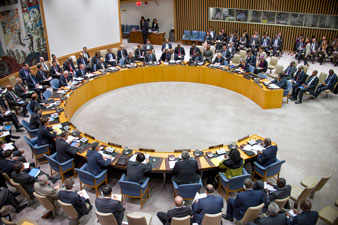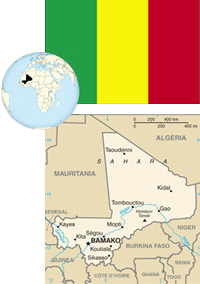Staff Writer

UNITED NATIONS (FinalCall.com) – Representatives from the African Union, the Economic Community of West Africa States and Mali’s interim government gathered at the UN Security Council expecting a resolution authorizing a 3,500 man African-led International Support Mission in Mali, but the North Korean missile launch hijacked the 15-member council’s attention.
The resolution was still in draft form at Final Call press time with the West African nation patiently waiting for authorization for the military force.
“The African Union hopes that the Security Council will authorize the deployment of AFISMA without delay,” Ambassador Tete Antonio of Mali’s UN Observer Mission to the United Nations told The Final Call on Dec. 10.

Mali, a Texas-sized nation of 14.5 million people, fell into trouble in March after junior army officers staged a coup, ousting the elected government of President Amadou Toumani Toure. On April 6, nomadic tribesman known as the Tuareg formed the National Movement for the Liberation of Azawad and declared independence for a large swath of territory in Northern Mali, claiming it as their homeland. These conditions created a perfect political storm for the chaos that engulfs Mali.
On Dec. 11, the army arrested the sitting interim prime minister, who then resigned, and the interim president immediately appointed a new interim prime minister. Dr. Susan Rice, the U.S. ambassador to the UN, told reporters there was concern about the stability of the regime in Bamako. “Mali has been and remains a very complex situation,” she told reporters Dec. 12.

Amb. Rice said the U.S. wanted a swift restoration of democratic government in Bamako but remained very much committed to a collective effort to rid northern Mali “from terrorists.”
According to the draft resolution, transitional government authorities in Mali are “requesting through a Security Council resolution, acting under Chapter VII as provided by the UN Charter of an international military force to assist the Armed Forces of Mali to recover the occupied regions in the north.”
“The deployment and operations of AFISMA would require strong United Nations support,” the African Union ambassador argued.
Bill Fletcher, Jr. author and longtime international activist, agreed with the AU ambassador, saying, “The AU ideally would not need a Security Council resolution, because they could handle this–but they are going to need financial backing and they probably are aware of the trap of getting into a protracted fight in the north of Mali. The AU does not want to get into this without some powerful backup.”
UN Secretary-General Ban Ki-Moon, through a spokesperson Dec. 5, “cautiously” recommended that the Security Council approve Mali force, but without UN financing. The UN has limited ability to deliver a support package in the near term to a combat force, the secretary-general’s representative told the Security Council. He recommended having the AU and Economic Community of West African States fund the force through volunteer contributions.
“That’s not the solution,” Amb. Antonio argued outside of the Security Council chamber. “Assessed contributions will be the best way to go,” he added, referring to operations funded by the UN.
According to talk outside of the Security Council chamber, former colonial master France has been the most vocal Western backer of the Mali force resolution. Gerard Araud, the French ambassador to the United Nations, suggested to reporters that his delegation was not happy with the UN decision not to fund the force.
In addition to questions about how the council would oversee the mission the question of how the force will be paid for remains, Amb. Araud said.
ECOWAS Commission president Kadre Desire Ouedraogo told the Security Council it needed to “act fast” in deploying the force, adding that the regional organization and the AU had a plan for political dialogue with the Tuareg, but it needed to be paired with a military option to help Mali regain its territory.
George Ayittey, an American University economics professor, president of the Washington, D.C.-based Free Africa Foundation and associate scholar at the Foreign Policy Research Institute, said he “considered the Tuareg cause to be legitimate.” But, he added, the situation has become “complicated” because of the March coup and constant linking of the Taureg movement to Al-Qaeda.
The causes of the Tuareg rebellion can be found in decades-old discrimination and persecution dating back to the 1960s, Prof. Ayittey noted.
“However, the entire West African region is just fed up with coups, which explains why ECOWAS moved swiftly to condemn it. This is the first time ECOWAS has taken such a strong position,” Prof. Ayittey said in an e-mail.
A Pentagon representative said the United States is advising ECOWAS.
Some independent analysts questioned whether the administration’s strategy could backfire, embroiling the U.S. in an intractable local conflict. “There is no place in the world the U.S. does not consider strategically important,” Dr. Stephen Zunes, professor of politics and chair of Middle Eastern Studies at the University of San Francisco, said via e-mail. “Unfortunately U.S. policy in the region is following some of the mistakes we have seen elsewhere, such as U.S.-led militarization increasing the problem rather than reducing it,” he added.
“African leaders need to stop asking the West to intervene in the lives of Africans on the continent,” said Omoyele Sowere, human rights activist and founder and publisher of Sahara Reporters.com. “I would say that Africa should not be a testing ground for military intervention–those interventions have never benefitted Africa,” he said.
Amb. Antonio saw things differently. “This force is not going to attack another African country, but it will attack a band of terrorists,” he said.












